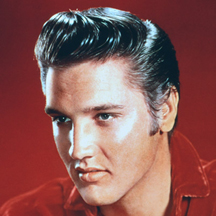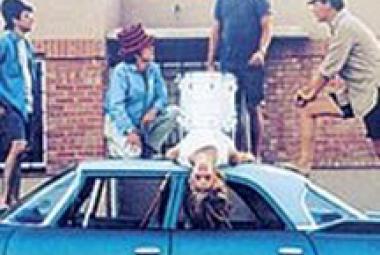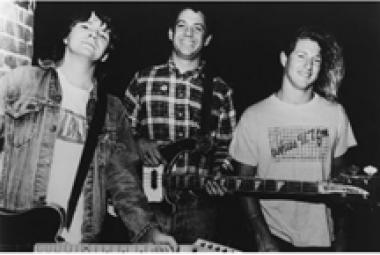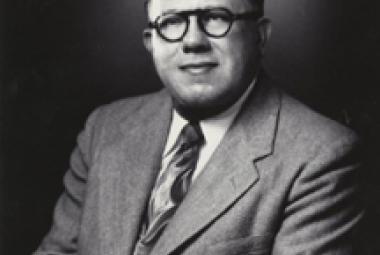Elvis Presley (January 8, 1935 – August 16, 1977), also known simply as Elvis, was an American singer and actor. Regarded as one of the most significant cultural icons of the 20th century, he is often referred to as “the King of Rock and Roll”, or simply, “the King”. A native of Tupelo, Mississippi, his music career began in Memphis, Tennessee in 1954, when he recorded a song with producer Sam Phillips at Sun Records. RCA Victor acquired his contract in a deal arranged by Colonel Tom Parker, who managed the singer for more than two decades. Presley’s first RCA single, “Heartbreak Hotel”, was released in January 1956 and became a number-one hit in the United States. In 1958, he was drafted into military service; he resumed his recording career two years later but devoted much of the 1960’s making Hollywood movies and their accompanying soundtrack albums. In 1968, following a seven-year break from live performances, he returned to the stage in the acclaimed televised comeback special Elvis, which led to an extended Las Vegas concert residency and a string of highly profitable tours. Commercially successful in many genres, including pop, blues and gospel, he is the best-selling solo artist in the history of recorded music, with estimated record sales of around 600 million units worldwide. (More from Wikipedia)
See Also: Elvis Presley
Writing for Allmusic, rock critic Bruce Eder states his case well: “Buddy Holly is perhaps the most anomalous legend of ’50s rock & roll – he had his share of hits, and he achieved major rock & roll stardom, but his importance transcends any sales figures or even the particulars of any one song (or group of songs) that he wrote or recorded. Holly was unique, his legendary status and his impact on popular music all the more extraordinary for having been achieved in barely 18 months. . . . In a career lasting from the spring of 1957 until the winter of 1958-1959 – less time than Elvis had at the top before the army took him (and less time, in fact, than Elvis spent in the army) – Holly became the single most influential creative force in early rock & roll. . . .
“Holly and the band weren’t afraid to experiment even on their singles, so that ‘Peggy Sue’ made use of the kind of changes in volume and timbre on the guitar that were usually reserved for instrumental records; similarly, ‘Words of Love’ was one of the earliest successful examples of double-tracked vocals in rock & roll, which the Beatles, in particular, would embrace in the ensuing decade.”
* * *
As important as he is in his home country, the influence of Buddy Holly among British musicians is incalculable. Quoting Bruce Eder again: “The group’s heavy use of rhythm guitar slotted right in with the sound of skiffle music, a mix of blues, folk, country, and jazz elements that constituted most of British youth’s introduction to playing music and their way into rock & roll. Additionally, although he cut an exciting figure on-stage, Holly looked a lot less likely a rock & roll star than Elvis – tall, lanky, and bespectacled, he looked like an ordinary guy who simply played and sang well, and part of his appeal as a rock & roll star was rooted in how unlikely he looked in that role. He provided inspiration – and a way into the music – for tens of thousands of British teenagers who also couldn’t imagine themselves rivals to Elvis or Gene Vincent in the dark and dangerous department. . . . Additionally, although he played several different kinds of guitar, Holly was specifically responsible for popularizing – some would say elevating to mystical, even magical status – the Fender Stratocaster, especially in England.”
* * *
Ritchie Valens released just two 45’s but still showed incredible versatility. His first, “Come On, Let’s Go” is now regarded as a straight-up rock and roll classic, but it failed to chart. Writing in 1998, Billy Vera recalls “first hearing [“Come On, Let’s Go”] on Alan Freed’s TV Dance Party, a local New York equivalent of Dick Clark’s American Bandstand. It was a record which really grabbed my teenaged ears. I had never heard anything quite like it. It had a much ‘thicker’ sound than anything by Elvis, Chuck Berry, Gene Vincent or even Eddie Cochran. For thickness, the only thing that came close was Bo Diddley.”
* * *
In 1972, Mick Farren published his first book, a comic-book style polemic that traces the development of the youth subculture from the 1950’s; the subtitle on the back cover is “How Elvis gave birth to the Angry Brigade”. The co-writer with him is Edward Barker, a cartoonist who designed the covers on the second and third albums by the Pink Fairies. The title is Watch Out Kids and is probably adapted from the lyric “Look out kids” in “Subterranean Homesick Blues” by Bob Dylan.
* * *
Under the artist name Mick Farren and Jack Lancaster, 1995 brought yet another side of Mick with The Deathray Tapes, a live performance consisting mostly of spoken-word material – but this is no 1960’s flower-child poetry reading. Most of the performances go on for 6 or 8 minutes, while “Envy” is just a short verse:
I used to envy Elvis, but then he got fat and died.
I used to envy Marlon Brando, but then he got fat and his kid died.
I used to envy Jim Morrison, but then I got out of the tub.
Now I don’t envy anyone, because it causes bloating, and far too many funerals.
* * *
After touring with him and making a movie together, Sylvie Vartan married Johnny Hallyday, a true French icon who is often referred to as the “French Elvis” and has sold 80 million albums worldwide (though he remains largely unknown in the English-speaking world). They flew to Nashville by the end of 1963 and recorded a best-selling album with the Jordanaires (who recorded with the real Elvis for many years) called Sylvie à Nashville; it sold one million copies in Japan alone. Three of the songs were in English, including one with Paul Anka. Sylvie Vartan and Johnny Hallyday were the country’s “golden couple” and had joint sellout shows annually in the 1960’s through the 1970’s.
(April 2015/1)
* * *
British soul singer Adele is one of the modern fans of Wanda Jackson and “Funnel of Love” in particular; from Wikipedia: “According to Jackson, Adele mentioned to her that if she had not heard ‘Funnel of Love’, then her 2010 single ‘Rolling in the Deep’ may have never existed. In 2010, Adele explained how Jackson’s music affected her: ‘I got addicted to this Wanda Jackson hits album,’ says the singer. ‘She’s so cheeky and so raunchy. She’s kind of like the female Elvis: really sexual, not afraid to embarrass herself.’ Adele’s interest in her music led to a stint as Jackson serving as her opening act in Britain between 2011 and 2012.”
(July 2015)
* * *















